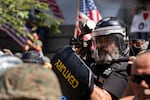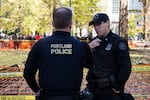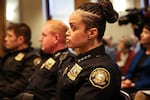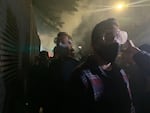This weekend, far right activists from across the country plan to descend on Delta Park in North Portland for a rally showcasing their “love for America and Western values,” according to the Proud Boys, the group organizing the event.
If history is a guide, they will be met by a large number of anti-fascist counter-protesters.
And there will be violence.
The Proud Boys, a hate group according to the Southern Poverty Law Center, call themselves western chauvinists and espouse a panoply of anti-Muslim, anti-LGBTQ and racist ideologies. They are notorious for starting street brawls at political rallies such as the one planned for Saturday.
Portland has been an epicenter of political protest for decades. The coming rally is part of a now familiar dynamic and one that has made Portland a recurring example of political violence in national conversations: conservative protesters from outside the city coming to Portland to stir up counter-protester reaction.
Progressive activists have been pushing for major changes in how the Portland Police Bureau is run for years, and they have protesting in the streets almost every night since Minneapolis police killed George Floyd in May.
But on this one topic, local protesters and police officers agree: It didn’t have to be this way. These now-regular brawls between right and left could have been avoided.

Proud Boy Alan Swinney fires paintballs at antifascist counter-protesters this summer. Fights between left- and right-wing protesters are now the norm in Portland.
Jonathan Levinson / Jonathan Levinson
For the past four years, rather than make difficult policy choices, elected officials have instead relied on short-term changes or politically expedient gestures. City leaders have politicized law enforcement instead of taking meaningful steps to prevent violent political street clashes or substantively fighting systemic racism.
“The blame goes beyond the mayor, in my opinion,” said one Portland police official, among several people in law enforcement who requested anonymity because they were not authorized to speak to the media. “Council altogether has abdicated their responsibility.”
Activists say a determined city leadership had options if they wanted to take action.
“These paramilitary activities that these groups engage in, there’s statutes and laws that allow you to push back against it,” said Bobbin Singh, executive director of the Oregon Justice Resource Center. “We and a number of other organizations collectively went to the mayor on multiple occasions and actually laid out a strategy for the city to push back through the courts, through policy, through public education. And they just never have moved forward with it.”
Portland Mayor Ted Wheeler and Commissioner Jo Ann Hardesty declined interview requests.
How we got here
The relationship between the police bureau and Portlanders has been tense for decades.
Officers say they feel unappreciated. That’s a common sentiment among law enforcement nationally, but is heightened in Portland, with its long tradition of being anti-authority and anti-police. Many in the city, particularly people from communities of color, point out that a large number of officers don’t live in Portland and claim they are openly disdainful of its residents. Only 18% of Portland police officers lived in Portland as of 2018, according to the Portland Mercury.
Critics point to numerous examples of problematic and racist policing over the years that reinforce and explain their skepticism: In 1981, two officers dumped dead opossums in front of the Black-owned Burger Barn. The officers were fired but later reinstated. Longtime Portland police officer Capt. Mark Kruger was suspended in 2010 when it was discovered he had built a memorial to Nazi soldiers in Rocky Butte Park 10 years prior. Kruger, who friends said had a well known affection for Hitler and Nazis, was suspended for the shrine but, after a lawsuit, his disciplinary letter was expunged and he was given back pay for his suspension. He remained with the bureau until he retired this March.
More recently, Portland Lt. Jeff Niiya angered many when the media surfaced what friendly-in-tone text messages he exchanged with the leader of Patriot Prayer, a far-right group based in Vancouver that has attracted racist and violent followers. According to the police bureau, the text messages between Niiya and Patriot Prayer leader Joey Gibson were part of Niiya’s official duties communicating with protest organizers, but they fed a well-established perception that the bureau is friendlier with far-right protesters than protesters on the left.

Portland Police Lt. Jeff Niiya, whose text exchanges with a far-right organizer added to a sense among some progressive activists that the bureau sides with right-wing demonstrators.
Bradley W. Parks / OPB
Portland’s struggles with how to balance the rights of non-violent protesters with public safety date at least as far back as Donald Trump’s election victory four years ago. Portland made national headlines after the election when thousands of people flooded the streets for days of demonstrations. The Associated Press called Portland the “epicenter” of anti-Trump protests. Two months later, as Trump was being sworn into office, the city again erupted in protest against his administration.
These left-wing protests, and Portland’s long history of progressive politics, drew a response from the other side. A loose group of pro-Trump groups began holding regular “free speech” events in Portland. Those increasingly turned into brawls between groups like Patriot Prayer and anti-fascist counter-protesters.
In May 2017, days after Jeremy Christian killed two people and injured a third in a racially motivated attack on a TriMet train, Mayor Ted Wheeler urged the federal government to revoke a protest permit issued to Patriot Prayer for a “free speech” rally on Terry Schrunk Plaza. Wheeler’s request catalyzed national militia groups and white supremacist organizations to come to Portland for the rally.
Some within the Portland Police Bureau saw that as the city’s elected officials picking a political side and creating a dynamic in which political groups had to fight over access to the public square. One officer said it delegitimized the city government.
By late 2018, there had been dozens of clashes on Portland streets. An Aug. 4, 2018, rally in Portland attracted far-right groups from across the country. Besides clashes between demonstrators, police seriously injured two people when they fired aerial distraction devices directly at them.
Days later, on Aug. 20, a handful of civil rights activists in the city met with the mayor to attempt to help end the cycle of violence.
The activists from the Council on American Islamic Relations and the Oregon Justice Resource Center, or OJRC, brought Wheeler a list of law enforcement experts they hoped could help city leaders figure out a more effective response to the political violence.
“One was a former FBI agent. One was a former CIA officer. One was an L.A. County sheriff officer and the other one was the former chief of police at a major police department,” said Zakir Khan, board chair of CAIR Oregon.
Wheeler did not bite.
“When we brought up consultants, Wheeler said ‘I hate consultants,’” Khan said.
The Charlottesville example
Other strategies Khan and OJRC suggested were also ignored.
Like nearly every state in the country, Oregon has a seldom-used anti-paramilitary law. These are laws codifying the government’s monopoly on the use of force for public safety and prohibiting the organized use of weapons or “techniques” for civil disorder.
In Virginia, the law was successfully used to stave off future protest violence in the wake of the 2017 Unite the Right rally in Charlottesville, a liberal college town surrounded by conservative parts of Virginia.
For two days, an array of hate groups rallied in Charlottesville, including neo-nazis, members of the Ku Klux Klan and self-professed neo-confederates and white nationalists.
Similar to far-right rallies in Portland, many of the attendees were dressed for combat; they wore body armor and tactical helmets, and carried rifles. By the end of the rally, Heather Heyer, a 32-year-old protesting racism, was dead and 19 people were injured after a self-identified white supremacist drove his car into a crowd.
As in Portland, Charlottesville officials lamented that little could be done to prevent such mayhem. They cited the sanctity of First and Second Amendment rights. But lawyers with Georgetown University Law Center’s Institute for Constitutional Advocacy and Protection filed a lawsuit on behalf of the city and local businesses against a number of rally organizers and attendees using Virginia’s anti-paramilitary laws.
They won. The Virginia Circuit Court ruling barred the defendants from coming to Charlottesville in groups of two or more and acting in concert while armed with any type of weapon during any demonstration, rally, protest or march.
Oregon has a similar unlawful paramilitary activity law which makes it illegal to teach someone else how to make or use weapons and techniques if the intention is for them to be used in “civil disorder.”
At that August 2018 meeting, Khan and OJRC raised the possibility with Wheeler of using a similar strategy in Portland.
The mayor was initially excited about the idea, Khan said. But his office did not follow up. Khan said he and other activists have had similar experiences with the mayor in the past.
“If you talk to other groups in the city, they’ll tell you the same exact story I’m telling you right now,” Khan said. “The mayor will meet with you, he’ll seem like he’s listening. It will seem like he thinks it’s a good idea, and there’s no follow through to actually achieve the thing.”
Singh said the city is so scared about “viewpoint discrimination,” favoring one group over another because of their political allegiances, that city leaders end up tolerating bigotry and street violence. They have failed to lay out and actively fight to realize a clear vision of inclusive democracy in the city, he said. And it isn’t simply that they haven’t done enough.
“What has the city actually done?” Singh asked. “What tangible, concrete thing has the city done to push back against this element? ... The leadership at the city all the way around is to blame. It’s not about pointing fingers, but it’s about really just accepting that the nothing that they’ve been doing has helped create these conditions.”
Seeking more city control
Portland’s elected leaders have also declined to embrace suggestions by police.
In November 2018, Wheeler and then-Portland Police Chief Danielle Outlaw did try a new approach: They proposed a city ordinance that would allow the police commissioner to dictate the time and place for demonstrations involving groups with a history of violence. Mayor Wheeler is the city’s police commissioner.
“We don’t have the advantage of being surrounded by other mid– to large-size police departments that can give us additional officers to increase our presence and lessen the likelihood of us using force,” Outlaw said at the time, describing the situation as unwinnable for Portland police.
Outlaw was hired in 2017 after an exhaustive national search for a new police chief and was seen as a potential fresh start for the bureau. The city’s first Black woman chief, she came with a reputation for using data to drive change as an assistant chief in Oakland where shootings had declined sharply over the previous decade.

Portland Police Chief Danielle Outlaw asked elected officials for more power to crack down on the location and manner of protests. They declined.
Amelia Templeton / OPB
But by the end of 2018, Outlaw had lost credibility with many in the city. After the Aug. 4 demonstration, she went on conservative talk show host Lars Larson’s show and compared protesters to children whining after they lost a schoolyard fight.
Reaction to the proposal was swift, and negative.
“There are reasonable, legal solutions to address violence on the streets — this ordinance is not one of them,” Mat Dos Santos, legal director of the ACLU of Oregon, said at the time. “The ordinance hands law enforcement and the mayor far too much power and risks undermining people’s ability to practice their constitutionally-protected right to speech and assembly.”
Mary McCord, who led the successful lawsuit on behalf of Charlottesville, wrote a seven-page letter on behalf of Georgetown’s Institute for Constitutional Advocacy and Protection explaining in detail why they believed Portland’s proposed ordinance was likely constitutional.
In the letter, McCord explained that, in her view, a legal challenge to the ordinance under the First Amendment would likely fail. On the contrary, she argued, the ordinance would ensure public safety and allow for freer expression during large demonstrations.
In an interview with OPB, McCord acknowledged the concerns civil rights groups voiced at the time.
“The complaints that I heard were things like, ‘police will only enforce this against people of color or racial justice protesters. They won’t enforce it against white people,’” McCord said. “But that’s an enforcement issue. And if in fact that’s what happened then yes, clearly that would be a First Amendment violation.”
Commissioner Chloe Eudaly was against the ordinance. Eudaly blamed the police bureau for mismanaging the protests and focused her criticism on the perception that police favor far-right groups like the Proud Boys and Patriot Prayer over left-wing counter-protesters.
Wheeler and then-Commissioner Dan Saltzman voted in favor of the proposal, which failed. Wheeler was criticized after the fact for failing to involve his colleagues in drafting the proposal or working to generate support in advance. None of the other three commissioners offered policy alternatives. Instead, Eudaly suggested that local businesses should refuse to serve far-right demonstrators and Portlanders should boycott businesses that serve the groups.
The violence continued. Multiple far-right demonstrations turned violent over the course of the next year.
In June 2019, Outlaw proposed a ban on face masks at protests and pushed for legal changes that would allow police to record protests. Neither idea moved forward. City Hall seemed paralyzed.
“I’ll be evaluating a whole variety of options,” Wheeler said at the time.
Whose job is it?
By the end of May 2020, when thousands took to the streets to protest against systemic racism and police brutality, Wheeler and city commissioners still had not taken any action to change their approach to protest-related violence.
Commissioner Eudaly said the protests present a challenge for the city since everyone has constitutionally protected rights, regardless of their political views.
“We see ample evidence of participants encouraging illegal behavior, whether it’s harassment, intimidation, or actual violence,” she said. “But because the organizers really carefully walk the line of never publicly encouraging or inciting violence, there’s very little we can do preemptively.”
McCord said pushing back against the violence doesn’t all have to fall on the city and state. The federal government also has tools available.
For example, Patriot Prayer leader Joey Gibson and many of his adherents live in Washington state and cross the Columbia River to demonstrate in Portland. Proud Boy leader Enrique Tarrio has said he’ll be flying into Portland for the Sept. 26 rally he’s planning.
Crossing state lines to engage in violence or civil disorder would appear to violate federal riot laws, McCord said.
After Eudaly spoke about the challenges of preemptive action, far-right activists in Oregon were revealed to have planned and trained for violence ahead of multiple recent demonstrations in Portland, including this weekend’s, the Guardian reported. In the messaging exchanged on the GroupMe app, some even discussed the possibility of political assassinations.
One person, who stressed the importance of being organized and acting together, encouraged attendees at an Aug. 22 rally in downtown Portland to violate local weapons laws saying, “If you’re going to play by the books tomorrow night, we already lost. We are here to make a change, laws will be broken, people will get hurt,” according to the Guardian.
At that rally, pro-Trump demonstrators and anti-fascist counter-demonstrators engaged in hand-to-hand combat for hours unimpeded by law enforcement.
While city and state officials just spent weeks trying to get federal law enforcement to stop policing the nightly protests in downtown Portland, McCord says federal officials can help — by enforcing other types of laws.
"I do think it’s totally fair for the mayor and the governor and the attorney general to say, ‘Hey, feds, people are traveling across state lines to engage in violent conduct,’ McCord said. “You don’t even have to cross state lines for that to be a federal charge.”
Federal prosecutors in Portland are taking action — but not against right-wing demonstrators.
This month, the U.S. Department of Justice charged some racial justice protesters with civil disturbance, arguing that protesters interfered with interstate commerce because they blocked roads.
Scott Asphaug, assistant U.S. attorney for Oregon, wouldn’t comment on the deliberative process behind charging decisions. He said “consideration of federal criminal charges is evaluated by applying the facts of the conduct to the elements of any potential charge.”
Why police are frustrated
Police officers say they are exhausted and, as repeated statements by rank-and-file officers and union leaders show, feeling unfairly blamed for broader societal problems. Even before the nation’s racial reckoning, officers were increasingly the face of systemic failure.
When mental health issues go untreated, or institutional neglect deprives whole communities of educational opportunities, it is often the police who wind up confronting the eventual outcomes of those failures.
In 2012, the Department of Justice launched an investigation into the Portland police after a string of people suffering from mental health crises died at the hands of officers. The investigation found that police were using excessive force on people in crisis. It also found that Oregon’s mental health care system was so inadequate that police were often the first, or the only responders in a crisis, and that “people in crisis are more likely to encounter the criminal justice system than the mental health system.”
“It’s just too easy for the elected officials to point fingers,” a bureau command staff officer told OPB, “… and give the appearance that they’re making substantive change by their focus on the police bureau when there are things that they should be doing within their own bureaus and systemic changes they could be making across the board.”
The police bureau has long been a political football in the city. The debate over whether Porland officers should participate in the FBI-led Joint Terrorism Task Force, for example, has been going on for almost 20 years.
Last year, commissioners voted to remove the city from the JTTF, a decision bureau leadership sharply criticized as politically motivated.
Fast forward to the racial justice protests that have now extended well past 100 days. Portland officers say that, once again, they feel a distinct lack of leadership from their elected bosses.

Portland Mayor Ted Wheeler attended one protest this summer and was tear gassed along with the crowd. Wheeler apologized for previous use of the gas and then limited and eventually banned its use to police demonstrations.
Rebecca Ellis / OPB
This is where the criticisms by police and progressive activists calling for more civilian oversight of officers overlap. The PPB official said policy makers are taking the politically expedient course of vocally pledging their allegiance to Black Lives Matter and re-envisioning the criminal justice system but they aren’t doing the difficult work of actually realizing that vision.
Many officers say they support some of the changes to the role of police that racial justice protesters are asking the city to make. For example, the official said they’d be more than happy if policy changes meant they never had to address a failure of the mental health system again or the social safety net that allows so many people to be houseless.
“Buddy, I’d take a 20% pay cut if you could do that for me,” the official said.
Singh, the executive director of the Oregon Justice Resource Center, acknowledges there is some rhetorical overlap but makes clear that PPB’s actions don’t match that sentiment. Earlier this month, he called for Wheeler to resign.
“The critical measure of whether or not they’re really interested in reform is if they are really interested in reallocating their power,” he said. “And part of that means with their union contracts. They have to be willing and open to be held accountable in a transparent way.”
State and city representatives haven’t been completely idle. City Council members, pushed by Commissioner Jo Ann Hardesty, pulled $12 million from the police bureau budget this summer and disbanded the controversial gun violence reduction team and school resource officer program. At the state level, legislators restricted the use of tear gas and choke holds during a summer special session.
All of those steps were relatively small in scope and focused more on restricting what police can do rather than answering fundamental questions about what role police should play in society.
“What it’s really going to take to change the bureau is a unified council that’s ready to do this really deep work with the community in order to really transform our whole approach to public safety and policing,” Eudaly said. “It really wasn’t until the death of George Floyd and this national uprising and ongoing protest in Portland streets that the political will emerged on Portland City Council to make significant cuts to the budget and to staffing.”
Police said that deep work isn’t happening. Instead, they said, elected leaders are taking a “keep voting for me and we’ll sort the rest out later” approach with voters and that they’re neglecting the arduous process of crafting policy and building consensus. Worse, they say budgets are being slashed and capabilities eliminated without any alternatives on the horizon.
Dozens of elected officials from the city, county, state and federal representatives have all condemned the violence that plays out on Portland streets with alarming regularity. Few, however, have offered meaningful policy solutions to address that dynamic or the protester complaints that have fueled more than 100 days of protest.
A spokesperson for the mayor said the city has made some progress towards racial equity and police reforms. He pointed to plans to expand Portland Street Response, opening more shelter beds, investments in permanent supportive housing, the ban on tear gas, and upcoming white supremacy awareness training for city council and bureau heads as examples.
Attendance estimates for this weekend’s far-right rally range between 3,000 and 10,000 people.
“The city has organized a multi-bureau response to prevent right wing extremists from threatening or harming our community,” Eudaly said. “We are hoping that community members will stay safe, stay away, and not give them the audience they’re desperately seeking.”
And the city is doing more than hoping for a positive outcome this time. On Wednesday, city officials denied a permit for the event, saying it is likely to violate policies from the Oregon Health Authority around large gatherings due to the pandemic.
Still, police officers and protesters both say they’ll remain skeptical of political leaders until protests like Saturday’s have a different outcome.
Meanwhile, racial justice protests are steadily marching towards their fifth straight month. And the police bureau is left using the same handful of tactics night after night, hoping to get different results.
“There’s only so many tactics we have in our tool belt,” the Portland Police Bureau official said. “If your hope is to change behavior simply by inflicting pain, I mean, what is that? In what world do any of us think that that’s the right tactic? It’s a very short term solution that ends up being damaging for us in the long term, in terms of legitimacy, and also just adding fuel to the fire.”
Conrad Wilson contributed to this story
